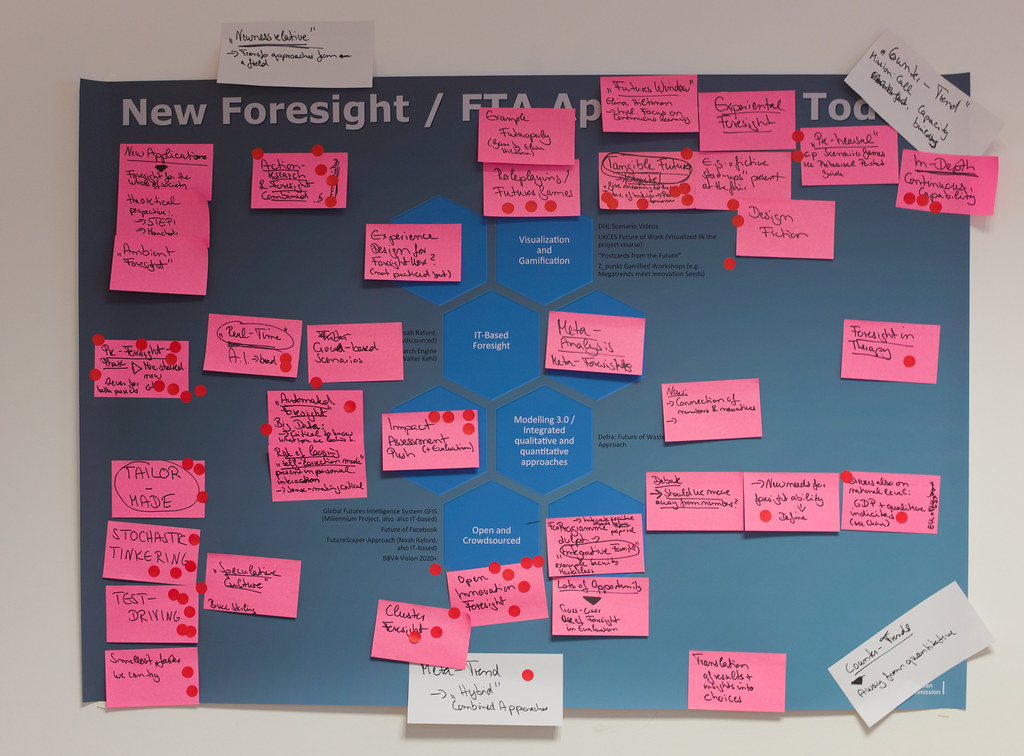Future Fabulators
This is an old revision of the document!
New Approaches And Needs In Foresight
(workshop at FTA 2014 - 27 NOV 2014)
short summary workshop “New approaches in FTA / foresight” at the EU FTA conference, November 2014
New Approaches
4 major clusters:
+ IT-based / "automated” foresight (in early stages, to be used with a "disclaimer” because of the current hype, experiences still have to be evaluated and sense-making still not generated;) Relies strongly on having had a precise "question" / task before starting
+ Integrated qualitative-quantitative approaches. Few examples, debated how far foresight should go - should never succumb to the traditional numbers dominance
+ Open and Crowdsourced
- Lots of potential also in terms of who funds foresight and how - crowdfunding possibilities e.g. for regional / community foresight
- Quite widespread in terms of open approaches
+ New forms of communication: Storytelling / Visualization / Gaming:
- Here, we had the most real "new" examples, e.g. from overlaps / working with Design Fiction, Experiential Foresight (Roleplaying), "Tangible Foresight" ("Exhibitions" / Futures Windows; Objects from the future, ...)
- Major potential for improving the impact / establishing new routes to engagement
- Further Trends / Tendencies: Impacts Assessment; Focus on Pre-Foresight-Phase (Conceptualization); Tailor-Made Foresight / Test-driving and then adapting approaches / Stochastic tinkering for finding best approach; Cluster / cross-sectoral foresight; Open Innovation Foresight ; Meta-Trend = towards hybrid / combined approaches
- new application fields also emerging, e.g. society-wide foresight, e.g. with kids; or foresight for therapy, …
New or Unmet Needs in Foresight
Where are new needs?
- Needs in Innovation Field are expanding
- Also in corporate foresight
- Health / social systems
- “Political” Foresight
Need for Shared Theoretical Background / Futures Literacy / practical principles
- Shared language / vocabulary
- Prove / exemplify impacts
- Practitioners being clear about values
- Need for more value-based approaches
Tools and Skills Needs
- Open Toolkits / Prototypes
- Take into account emotions and experience
- Use of narratives / storytelling; stimulating the imagination
- Integrate diversity of input (“overflow” effect)
- Selling power needed
- Bridge need for reflecting complexity and smart / emotional communication means
- Speed - can we provide instant gratification in foresight?
- Need for skills in change management / changing of cultures (in organizations)
Lots of room for improvement in realm of implementing results / link to decision-making
- Improve impacts by analysing power / timing issues (right person / right time)
- Clarify objectives; Increase acceptance of outputs; give meaning to results
- Create link to implementation / strategy (top-down or bottom-up?); internalization needed
- Create demand for citizens
Foresight 2030
- Many alternative scenarios possible
- Threat of “automation” / takeover from other disciplines / actors
- Opportunity for larger-scale roll-out if being clear on what it can and can't do, relies on clearly demonstrated benefits
- Foresight as an everyday tool: low cost and easily accessible tools for the everyday user - personal fore-sighting
- Professional foresight becomes more about framing, sense making and narrative - as scanning becomes more automated
Who pays for foresight in 2030? Alongside a traditional commissioning model by corporations and governments, crowd funded foresight occurs when groups of individuals involved in communities/advocacy come together to co-fund the foresight projects they really want to see
- Foresight becomes part of developing resilience, adapting to change and facilitating behavioral shifts and changing culture
Overall insight, across all 3 groups / topics: New approaches are developing rapidly, especially from working with / overlaps with approaches from other disciplines. The (partly normative) discussion in the community is still missing on which new approaches to push where and for what specific purpose, or where / how to also “counteract” trends and safeguard foresight depth and quality levels.



